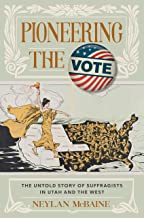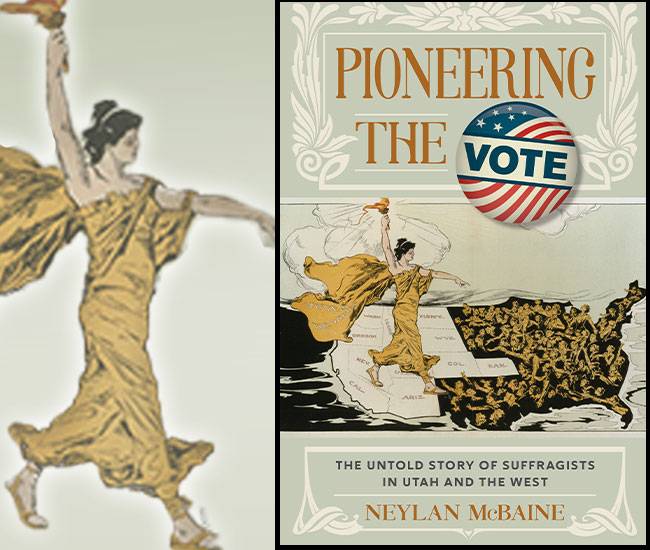Pioneering the Vote, The Untold Story of Suffragists in Utah and the West by Neylan McBaine
Five years ago, looking ahead to the centennial of women’s suffrage in the United States, Neylan McBaine embarked on a story that has been largely neglected. In her new book, Pioneering the Vote, The Untold Story of Suffragists in Utah and the West (Shadow Mountain), she examines the tangled history of how women gained and lost and once more won the vote in the state of Utah. Along the way, she shows that the Western states, in contrast with the presumably more progressive states of the East Coast, led the way in the long slog toward state-by-state passage of suffrage referendums.
It has been about 50 years since the start of the crusade to write women into history, and celebrating the Nineteenth Amendment presents an important opportunity to revisit the established narrative of how women got the vote. Astonishingly, many Americans are just now learning about the racism that permeated the suffrage movement. Similarly, it is startling to read McBaine’s account of how the vote became wound up with Mormonism and polygamy in mid to late nineteenth-century Utah.
Many historians believe that the overarching theme in the history of American women is the shift from the private, domestic sphere to the broader public arena where they found their voices. Pioneering the Vote makes the case with a twist. In Utah, the private sphere was dominated by a widely known church policy, the Mormon doctrine that a man should eschew monogamy to marry more than one woman in the course of his life. Consequently, women swung between supporting their faith along with their husbands, sons, brothers, and fathers and raging against religious leaders intent on keeping them out of the spotlight.
The author, who worked in public relations and marketing before becoming a writer who specializes in women and Mormonism, introduces us to a constellation of suffragists who fought for the vote on the local, regional, and national levels. Susan B. Anthony, Elizabeth Cady Stanton, and Rev. Anna Howard Shaw make requisite appearances, but McBaine focuses on Emmeline B. Wells, a member of the Church of Jesus Christ of Latter-Day Saints and an unsung heroine of the movement. Blending fiction and nonfiction, McBaine portrays Wells as an indefatigable strategist, thrice-married, who is filled with romantic longing throughout her 93 years.
While much of the book takes place during a long weekend in May 1895 when Wells and her colleagues welcomed members of the National American Woman Suffrage Association to Salt Lake City for a convention, McBaine’s story reaches back to 1870 when Utah first granted women the right to vote and culminates in 1919 with the nation on the threshold of passing the Nineteenth Amendment.
As the longtime editor of Women’s Exponent, one of many suffrage newspapers that flourished during the interminable years in pursuit of the vote, Wells illuminated the philosophy and politics of suffrage. As president of the Relief Society, a women’s charity organization founded in 1842 in Nauvoo, Illinois, from where the Mormons fled persecution, Wells supported the men and women of her community. Like the struggle for suffrage that is documented in this book, her life informs us about leadership and change.





